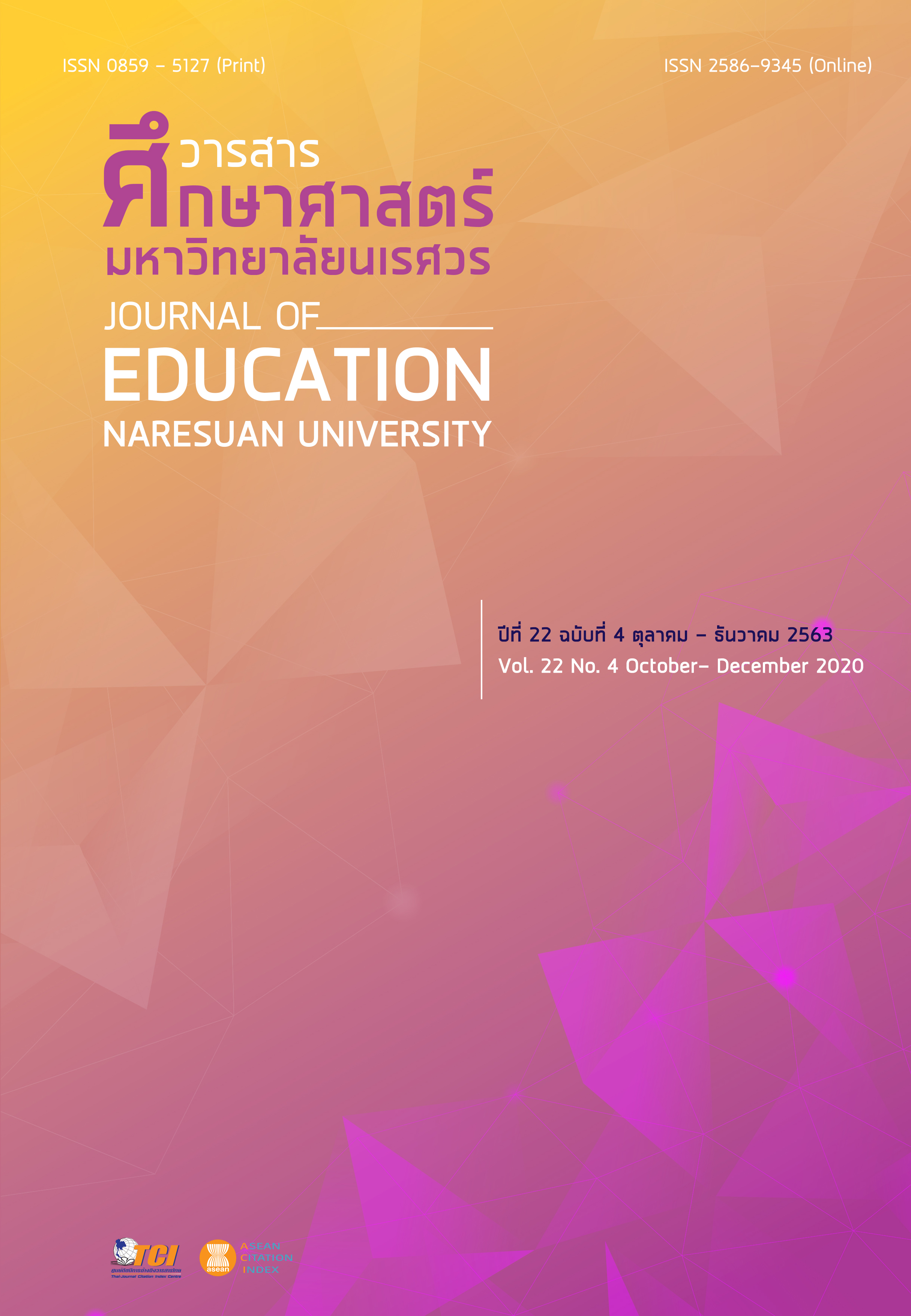RESULTS OF USING RESULTS OF USING EXPERIENTIAL ACTIVITIES PLANNER SUPPORTING WITH BRAIN GYMS TO ENHANCE DELIGHTED LEARNING AND EFFICIENT STUDY BEHAVIORS OF STUDENTS IN THE TEACHING PROFESSION AND BEING TEACHER COURSE ผลการใช้แผนการออกแบบประสบการณ์เสริมด้วยการบริหารสมอง เพื่อเสริมสร้างการเรียนรู้อย่างมีความสุขและพฤติกรรมการเรียนอย่างมีประสิทธิภาพของนักศึกษาที่เรียนในรายวิชาวิชาชีพครูและความเป็นครู
Main Article Content
Abstract
The objectives of this research were: to develop and study results of using experiential activities planner supporting with brain gyms to enhance delighted learning and efficient studying behaviors of students in the teaching profession and being teacher course. The sample group consisted of 67 third year social studies students. The three research tools were the experiential activities planner with brain gyms, the behavior measurement of learning happily, the behavior measurement of efficient studying, and the student satisfaction questionnaire on learning activities according to experiential activities planner. Average, standard deviation and t-test were employed for data analysis. The research findings were: 1) experiential activities planner included 3 stages of development: 1.1) inspire, 1.2) pay attention to learning to happiness consisted of 6 steps: (1) warm–up, (2) problem identification, (3) individual exploration, (4) group work, (5) communication, and (6) debriefing, and 1.3) summarize and happy reflection. Meanwhile, the stage of pay attention to learning to happiness Quality inspection result of experiential activities planner was the most appropriate. Usage result of the planner also found that average score of learning behavior happily and efficient studying behavior after the implementation were 80% higher than the criteria. Moreover, the average score also was statistically significant higher than of it’s before at the .05 level.
Article Details
The owner of the article does not copy or violate any of its copyright. If any copyright infringement occurs or prosecution, in any case, the Editorial Board is not involved in all the rights to the owner of the article to be performed.
References
Bloom, B. (1976). Human characteristics and school learning. New York: McGraw-Hill.
Boonphadung, S. (2015). Development of critical information retrieval skills via the use of ARCS Model with students in Suan Sunandha Rajabhat University. Journal of Education Naresuan University, 17(3), 10-20. [in Thai]
Boonsue, K. (1997). Delighted learning theory, learning prototype on theory and practice. Bangkok: Idea Square. [in Thai]
Department of Mental Health. (2000). The development of Thai emotional intelligence screening test for Thai People aged 12-60 years Research Reports. Bangkok: Department of Mental Health. [in Thai]
Kumnuanmasokg, N., et al. (1980). The waste of education failure of the students in elementary level research reports. Bangkok: The National Institute for Child Research. [in Thai]
Makcharoen, L. (2011). Psycho-social factors and well-being related to effective learning behavior of accounting student in Faculty of Business Administration Rajamangala University of Technology Phra Nakhon (Master thesis). Bangkok: Srinakharinwirot University. [in Thai]
Parkbongkoch, C. (2001). Joy enhanced parenting. Journal of Behavioral Science, 7(1), 29-34. [in Thai]
Paribatra na Ayudhya, D. (2006). Learning to excellence. Bangkok: Rakluke Family Group. [in Thai]
Phakdee, B. (2013). The effect of happy learning by doing activities on ratio and percentage toward analytical thinking, life skill and happy learning of Matthayomsuksa II student (Master thesis). Bangkok: Srinakharinwirot University. [in Thai]
Phra Paisal Visalo. (2011). The students’ happiness for wisdom of the earth. Bangkok: Student Affairs Division Mahidol University. [in Thai]
Phunsawat, S. (2004). A Study of Teaching Conditions Related with Happy Learning of the Chanthaburi College of Dramatic Arts Students (Master thesis). Chanthaburi: Rambhai Barni Rajabhat University. [in Thai]
Ratanavilaisakul, R. (2002). A study of the lecturer’s characteristics perceived as desirable by King Mongkut’s University of Technology Thonburi student and lecturers. KMUTT Research and Development Journal, 25(2), 150-165. [in Thai]
Seeluangpetch, S. (2001). The results of application techniques for learning happily in science class for Matthayomsuksa 1 students (Master thesis). Khon Kaen: Khon Kaen University. [in Thai]
Simcharoen, S. (2010). Brain activation. Bangkok: Moh Chao Ban Publishing House. [in Thai]
Sirisamphan, O. (2007). Study of student learning. Bangkok: Faculty of Education, Silpakorn University. [in Thai]
Suwunpugdi, S. (1998). Factors related to adjustment of nursing students at Southern Colleges of Nursing Ministry of Public Health (Master thesis). Bangkok: Srinakharinwirot University. [in Thai]
The Art and Cultural Institute for Development (MAYA). (2000). The heart of perseverance. Bangkok: The Art and Cultural Institute for Development (MAYA). [in Thai]
Waiyasusri, R. (2014). The use of brain-activation techniques for increased earning achievements. Bangkok: Dhurakij Pundit University. [in Thai]


